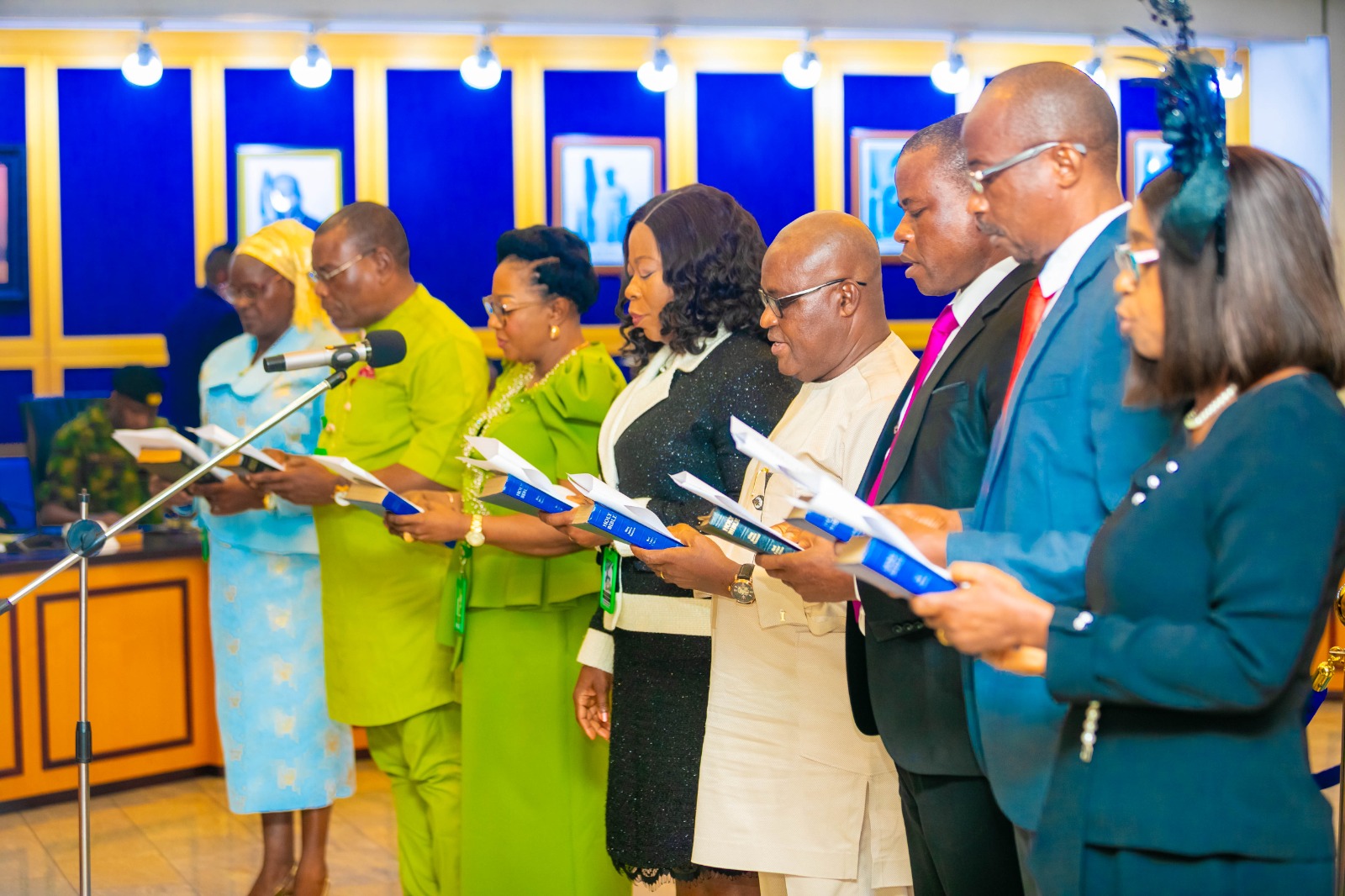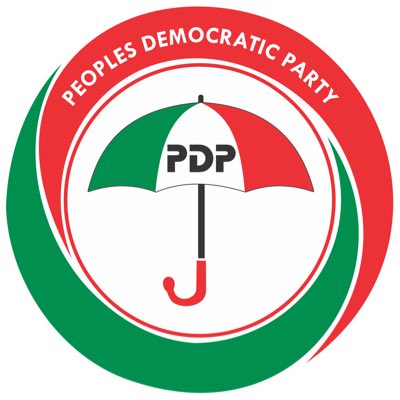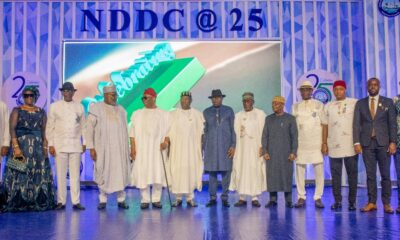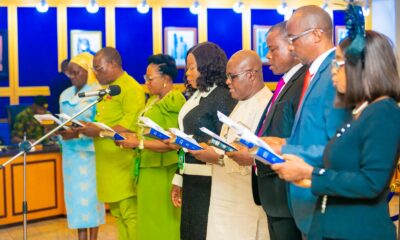News
Widening A Killing Field …Mark’s Death-Penalty Call For Oil Thieves
Since Nigeria discovered crude oil in commercial quantities in Oloibiri in today’s Bayelsa State in the early 50’s, the country’s life has depended largely on what has come to be known as black gold. Indeed, the sustenance, survival and growth of her economy and peoples today is determined by foreign exchange earnings from exports of crude and sale of its refined products to the people.
Crude oil has a history of annexure with impunity, and of systemic denial of peoples of the areas it was sourced. Infact, a visit to Oloibiri would force the first timer to shudder if indeed the product is a curse to the people or blessing only to others, not the people.
That systemic marginalisation, manifested profoundly in the infrastructural decay of host communities and the flamboyance of oil company workers, mostly multi-nationals whose houseboats, were the first source of electricity light, in the usually dark horizon of the once peaceful fishing villages.
With the high economic power of such foreigners, as against the abysmally woeful purchasing power of the locals, the girl became an easy prey to red-eyed multi-nationals who on a near-frequent basis, mindlessly induced the vulnerable lot into early prostitution, while productive young people became their reluctant pimps, escorts or ferry canoe-men for their escapades into the interiors.
But the desecration of the once self-content oil bearing areas was not limited to the socio-economic front. The environmental impact was very huge and indeed threatened the only occupations the people knew, fishing, farming, basket weaving, canoe making and the like. The usually green vegetations turned black as they were totally polluted, resulting in lifeless rivers, farm lands, unfit for fishing and farming, even as the wells, which the locals depended on for drinking water, turned brown.
If the socio-economic and environmental factors were demeaning and made peoples of the oil bearing communities second-class citizens, in their own country, their denial of political space was even more frustrating. Being minorities, it required a thoughtful majority to grant them political space to push the protest, but same was denied even before they were made.
That was on account of a pre-reached resolution by those majority tribes expected to do right. That resolution simply tagged oil as A Gift from God. To whom? A natural treasure. Whose? Hence unbefitting of the special place Agricultural success enjoyed.
Merely because, being majority, those who lacked the said natural and later national gift said so, oil producing areas were willfully denied control of the God given land’s resources as was the case in the days of the groundnut pyramids, cocoa and all. From between 50 percent and 100 percent enjoyed, derivation to oil producing areas, crawled from zero percent, one and half percent, 3 percent, 5 percent and today 13 per cent.
Of course, these were not without protests. Infact, it was when all civil protests made by the people, attracted from the powers that be, the usual response, ‘something is in the pipeline’ that the thoroughly suffocated youth went, in search of the content of the pipelines, directly aggravated also by their systemic denial of sources of livelihood.
Of course, no slave driver willingly frees a good slave without a fight, and so the federal authorities kicked. It was the resultant threat which that face-off posed to the easy sucking of the crude for export and survival of the nation that hastened amnesty for Niger Delta militants.
This brief background has become necessary because of fresh calls to include, oil theft among offences that must attract capital punishment. The question being, can one steal something that belongs to none? A gift from God to all? Like the Air? If there indeed are armed oil thieves, is it not safe to say, that the federal government that forcefully converted a people’s land’s natural gift to a national inheritance are the first culprits?
Without such military might (armed) could the federal government forcefully take what it did not own? (robbery). Were the peoples of the Niger Delta, given the opportunity to decide whether they wished to be a part of the forced amalgamation called Nigeria and for which crude-oil sourced there-from must be for all? Is Nigeria willing to pop that question to the oil bearing communities? To know, if they would wish to surrender their heritage in a Sovereign National Conference?
Last week, Nigeria’s Senate President David Mark canvassed death penalty as punishment for oil theft, due to the damaging effects of the crime to the nation’s survival.
In canvassing capital punishment for crude oil thieves, the key consideration is the threat which the practice poses to the economy of Nigeria, not the marginalisation it’s exploitation and sale had caused to the people whose farmlands and rivers remain the drilling fields with attendant woes. To make oil theft a capital offence therefore, the treasure should first be given to its owners, who alone should complain of the theft of their inheritance and backed by the central government.
What lack of patriotism? I can imagine many wondering. Fact is, wrong as oil theft may be, making it an offence that will attract death penalty is over-widening the nation’s killing fields, and there’s no telling how many Nigerians would be innocent.
Theft or armed robbery flourishes partly because there are willing patrons of the loot the thieve brings. Armed robbery is expensive, so a starter requires a criminally minded rich sponsor for arms. Like armed robbery, crude oil theft is a multi-dimensional crime that covers many skilled and unskilled participants in the banking sector, government, the security forces, multi-nationals, the local refinery owner called ‘kpo-fire,’ the rural trader buying and selling the product, the oil company staff willing to compromise trust for extra earnings, the marketer who mixes adulterated products, the NNPC staff detailed to the discharge point, the tanker driver who sells some drums on the way, and indeed the unemployed youth forgotten by his country, seeking a livelihood, the hard way.
Such is the chain. Such, the number of those likely to be affected. The difference between armed robbery and oil theft however, is that, in the case of the latter, it has always been perceived as a stolen property which when restolen constitutes no offence. This is perhaps why those involved believe that they are merely taking a bit of what has been forcefully made a general gift for all.
Therefore, it will require more than imposition of death penalty to change that mindset. It will require a total remediation of the Niger Delta environment, an acceptance of guilt by the federal government, and an agreement that the product belongs to the owners of the land and rivers the gift was sourced, based on global law who alone should determine what percentage to share or pay in taxes. It is when that ownership is established based on natural law, that an oil thief should be killed for forcefully taking what belongs to another. That too, has a caveat.
The crime must result in the death of the owner to attract the death penalty. Except in very few instances, such is the key ingredient that defines capital punishment in the United States of America (USA) whose democracy we’ve copied.
Perhaps a cursory look at offences that fit the redline will help. (additional facts from the web)
The following are offences that attract either death penalty or life imprisonment in the US
. Causing death by using a chemical weapon
.killing a member of Congress, the Cabinet or the United States Supreme Court
.Kidnapping a member of Congress, Cabinet of the United States Supreme Court resulting in death
.Conspiracy to kill a member of the Congress, Cabinet of the US Supreme Court resulting in death
.Causing death by using an explosive
.Causing death by using an illegal firearm
.Genocide
.First Degree Murder
.Murder perpetrated by poison or lying wait
.Murder that is willful, deliberate, malicious and premeditated
.Murder in the perpetration of or in the attempt to perpetrate any arson, escape kidnapping, treason, espionage, sabotage, aggravated sexual abuse or sexual abuse, child abuse, burglary or robbery
. Murder perpetrated as part of a pattern or practice of assault or torture against a child or children
.Murder committed by a federal prisoner or an escaped federal prisoner sentenced to 15 years to life or a more severe penalty
.Assassinating the President or member of his staff
.Kidnapping the President or a member of his staff resulting in death
.Killing persons aiding federal investigation or state correctional officers
.Sexual abuse resulting in death
.Sexual exploitation of children resulting in death.
.Torture resulting in death
.War crimes resulting in death
.Crimes against humanity
.Attempting, authorising or advising the killing of any officer, juror, or witness in cases involving continuing criminal enterprise, even if such killing does not occur.
Thus, as it may be that a country’s laws are depended largely on its peculiar problems, frustrations, needs, experiences, hopes and fears, and oil theft a major crime against our economy, the offence does not require a capital punishment or a separate law to tackle. The country’s criminal code provides for ways and means of checking theft and robbery, and attracts a death penalty if that crime results in the death of another.
What is required instead is proper policing of our oil and gas production infrastructure by competent, patriotic and indeed God fearing security operatives.
My Agony is that the first victims of such law would be the unemployed youth daily engaged to locally refine crude oil and not all others in the chain that make the theft possible. Or do you not know that the oil thieves and security men posted to such red zones may not be best of friends, but are never enemies in combat, except when the thief is greedy, the security, too pious. And they are few.
News
Ibas Inaugurates RSIEC, Service Commissions, Healthcare Board In Rivers …Charges Appointees To Embrace Principles Of Service

The Administrator of Rivers State, Vice Admiral (Rtd) Ibok-Ete Ibas, has charged newly appointed Board members to uphold the highest standards of discipline, competence, integrity, and unwavering dedication in their service to the State.
He emphasized that such commitment is critical to stabilizing governance, restoring democratic institutions, and advancing the principles of good governance in the State.
This was contained in a statement by the Administrator’s Senior Special Adviser on Media, Hector Igbikiowubo on Monday.
Ibas issued the charge on Monday while inaugurating the reconstituted Rivers State Independent Electoral Commission (RSIEC), Rivers State Civil Service Commission, Rivers State Local Government Service Commission, and the Rivers State Primary Health Care Management Board at Government House, Port Harcourt.
The Administrator urged the new appointees to embrace their roles with diligence, patriotism, and a commitment to transforming Rivers State through excellent service.
Addressing the Chairman and members of RSIEC, Ibas underscored their pivotal role in ensuring credible local government elections that reflect the will of the people.
“Your task is clear but demanding: to conduct free, fair, transparent, and credible elections at the grassroots level. You must resist bias, favoritism, and external interference while restoring public confidence in the electoral process,” he stated.
“The independence of your actions is crucial to sustaining peace, stability, and grassroots governance. I urge you to act with fairness, impartiality, and professionalism—even in the face of difficult choices,” Ibas added.
The Sole Administrator also charged the Rivers State Civil Service Commission on the need to eliminate mediocrity and foster a culture of excellence through merit-based recruitment, training, and promotions.
“The civil service must transition from favoritism to competence, integrity, and accountability. Your commission will lead reforms, including digital transformation and standardized practices across ministries, departments, and agencies,” he said.
He disclosed that extensive training programmes are underway, with a committee set up to overhaul the public service framework for greater efficiency.
Meanwhile, Ibas urged the Rivers State Local Government Service Commission to ensure professionalism and discipline in local government administration.
“As the closest tier of government to the people, you must drive reforms that insulate the system from politics and mediocrity. Your mandate includes merit-based recruitment, training, and enforcing standards for effective service delivery,” he stated.
In the same vein, the Administrator charged the Rivers State Primary Health Care Management Board with revitalizing healthcare delivery across the state’s 23 local government areas.
“Primary healthcare is the foundation of a sustainable health system. Your board must ensure facilities are adequately staffed, equipped, and operational focusing on maternal health, immunization, malaria control, and community health services,” he said.
He emphasized data-driven operations, incentives for rural health workers, and restoring the referral system to improve healthcare access.
He also assured the Board of sustained government support, including funding, for the effective discharge of their mandates but warned that board members would be held accountable for their performance.
The newly inaugurated members include: RSIEC: Dr. Michael Ekpai Odey (Chairman) with Prof. Arthur Nwafor, Prof. Joyce Akaninwor, and others as members.
Civil Service Commission: Dr. Livinus Bariki (Chairman), Amb. Lot Egopija, Mrs. Maeve Bestman, and others.
Local Govt. Service Commission: Mr. Isreal Amadi (Chairman), Rear Adm. Emmanuel Ofik (Rtd), Dr. Tonye Pepple, and others.
Primary Health Care Board: Dr. Dawari George (Chairman), Dr. Chituru Adiele (Executive Director), Prof. Kaladada Korubo, and representatives from key ministries.
News
Rivers PDP Debunks Sale Of LGA Election Forms

The Publicity Secretary of the Peoples Democratic Party (PDP) in Rivers State, Dr. Kenneth Yowika, has debunked claims that the party has commenced sale of forms for chairmanship and councillorship elections across the 23 local government areas of the state.
Yowika made the rebuttal in a statement made available to newsmen on Wednesday, describing the publication on the social media as baseless and untrue.
He urged members of the PDP to disregard the claim, saying that official communication regarding the sale of forms would be disclosed through the appropriate channels.
“With reference to information trending on social media, it has been falsely claimed that the sale of forms for Chairmanship and Councillorship elections in the 23 Local Government Areas (LGAs) of Rivers State will begin soon.
“However, the party has firmly denied these rumours, stating that they are baseless and untrue.
“The party has its own established methods of reaching out to its numerous supporters.
“The People’s Democratic Party, a law-abiding organisation, will patiently await the release of guidelines from the recently inaugurated Rivers State Independent Electoral Commission (RSIEC) before considering any sale of election forms.
“The PDP is urging its members to remain calm as official communication regarding the sale of forms will be disclosed through appropriate channels,” the statement read.
Enoch Epelle
News
South-South contributes N34trn to Nigeria’s economy in 2024 – Institute
Prof. Pius Olanrewaju, President of the Chartered Institute of Bankers of Nigeria (CIBN), has stated that the South-South region contributes N34 trillion to country’s economy in 2024.
He made the remark at the South-South Zonal Banking and Finance Conference in Calabar, yesterday.
He spoke on the theme, ‘’Building An Inclusive South-South: Economic Diversification as a Catalyst For Development.’’
Olanrewaju, who quoted the data from the Cable Data Index, said the feat was more than 21 per cent of Nigeria’s real Gross Domestic Product (GDP).
The president described the growth as ‘’ impressive,’’ saying that it was not driven by oil alone but significant expansions in trade, services, and the creative industries.
According to him, to fully harness this potential, coordinated financial, technological, and policy support is essential.
“As we work to reposition the South-South for broad-based prosperity, the financial system must play a central role, not merely as a source of capital, but as a catalyst for innovation, ideas incubation, and inclusive economic growth.
“This conference, therefore, provides a strategic opportunity for stakeholders to reimagine the South-South economy, not merely as a resource belt, but as a region of diverse capabilities and resilient enterprises.”
Olanrewaju added that Nigeria must move beyond old models and chart a new course for the development of the South-South region, where financial institutions and stakeholder collaborate to diversify the economy for shared prosperity.
He, however, commended Gov. Bassey Otu for his pledge of land for CIBN Secretariat in Cross River and being the first sitting governor to willingly undergo and complete the Chartered Bankers Programme.
On his part, Gov. Otu said that the conference discussion on the economic diversification in South-South region was timely against the backdrop of global trade and economic volatility that was affecting the nation’s economy.
Represented by his deputy, Mr Peter Odey, Otu said the South-South region must now act with urgency to diversify its economy while leveraging its shared natural endowment in agriculture and extractive resources.
“This conference must help develop tailored financial solutions that reflect the unique strengths and realities of states like Cross River in the south-south.
“Diversification should be evidence-based and must be backed not just by financial advice but project focused financing and real investment support,” he noted.
He said that Cross River had taken the bold step to invest in its agricultural sector by launching an Agro processing hub.
Otu further said that the state had invested in aviation by acquiring more aircrafts for Cally Air, construction of the Bakassi Deep Seaport and injecting N18 billion in its tourism sector.
Similarly, Mr Tolefe Jibunoh, Cross River Branch Controller of the Central Bank of Nigeria (CBN) said that the region was blessed with natural resources, cultural diversities and immense human potentials.
Jibunoh, who was represented by Mr Segun Shittu, Head, Currency Control Office, CBN, Calabar, noted that strategic diversification could unlock unprecedented opportunities for growth in the region.
He added that the CBN remained steadfast to maintain monetary possibilities and promote a sound financial system as a catalyst for sustainable economic development for the benefit of all.
-
News15 hours ago
NOA Set To Unveil National Values Charter — D-G
-
Politics11 hours ago
2027: Group Vows To Prevail On Diri To Dump PDP For APC
-

 Features14 hours ago
Features14 hours ago25 Years After: NDDC Celebrates Milestones Of Impactful Development
-
Business16 hours ago
NCDMB Promises Oil Industry Synergy With Safety Boots Firm
-

 News12 hours ago
News12 hours agoRivers Police Arrest Notorious Cultist, Recover Sophisticated Ammunition
-
Niger Delta15 hours ago
Adopt African System Against Crime, Don Urges Security Agencies
-

 News10 hours ago
News10 hours agoIbas Inaugurates RSIEC, Service Commissions, Healthcare Board In Rivers …Charges Appointees To Embrace Principles Of Service
-
Rivers14 hours ago
Monarch Cautions Youths Against Illicit Drug Consumption

